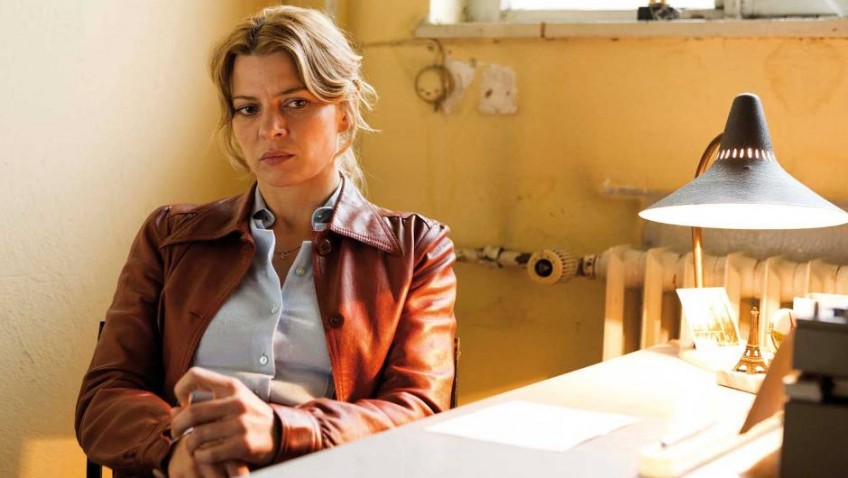German filmmakers remain fascinated not only with exploring the legacy and repercussions of the Nazis, but equally, of the Cold War and the divided East and West Germany that followed World War II. Writer/Director Christian Petzold might have all but cornered the market in the UK with stories of dramatic intrigue featuring strong female protagonists seeking a new life in the West. But with, West (Westen), based on an autobiographical novel by Julia Franck, 36-year-old Christian Schwochow shows himself to be a promising contender.
Along with a visceral, fearless performance from Jördis Triebel, what distinguishes West is its unfamiliar setting in a West Berlin Refugee Camp in the 1970s. It has been three years since scientist Nelly Senff’s (Triebel) boyfriend, Wassilij (Carlo Lujbek) is reported to have died in a car accident while at a conference in the Soviet Union. Nelly, and their son Alexej (Tristan Gobel), need to forget the past and have gone through all the preparations to begin a new life in the West.
But West Berlin’s freedom and prosperity elude Nelly, who is continually humiliated with strip-searches, interviews by agents in the Allied Security Services, job offers below her PhD level and demoralised by her living arrangements. For Nelly and Alexej are all but incarcerated in the Marienfelde Refugee Transit Camp, where there is no privacy. They share living facilities, a kitchen, laundry and a bathroom with strangers who have languished there, ‘unprocessed’, for months, if not years.
The film follows Nelly’s attempts to earn enough ‘stamps’ to find a job and a flat and leave the Camp. While Nelly befriends a few people at the Centre, one of whom, Hans (Alexander Scheer), becomes a father-figure to Alexej, her attempt to forge a new life is poisoned by the professional and personal attention of John Bird (Jacky Ido), a bilingual American agent.
He plants in Nelly’s mind his suspicion that Wassilij was a Stasi spy (all those days away at conferences…) who defected to the West and faked his death to evade capture. Bird speculates that Wassilij might be living under an assumed identity in Berlin, and that Nelly’s life might be in danger as the mother of his child.
Nelly becomes so paranoid that she suspects the shy, lonely Hans (a former prisoner of conscience with a prison record) of being an enemy agent (why is he always hanging around?), and destroys flowers she finds in her room, blind to the fact that they were a present from Alexej. Who can she trust? What is the truth?
What is totally believable is Nelly’s emotional rollercoaster of a ride and the playing out of her complex feelings in an engrossing and unpredictable screen adaptation by the director’s mother Heide. With her husband and Christian, Heide also fled the East for the West. Although the transition was nowhere near as traumatic for the Schwochow’s, who found private accommodation and work, they still felt alienated in a very different society, a feeling Heide dramatises so authentically in West.
While West is an absorbing look at a little known slice of history, the Refuge Camp, it could benefit from clarification of the character of John Bird, a married agent whose motives for risking his job in his relationship with Nelly remain uncertain. He seems to be well-meaning and even kind, but are his ideas straight out of Spy Kids; an excuse to get closer to Nelly or superb intelligence intended to protect Nelly and Alexej? And in refusing to explore the basis of Nelly’s fears, the film whittles down to being a portrait of a paranoid woman, when it has the potential of being so much more.
Joyce Glasser




